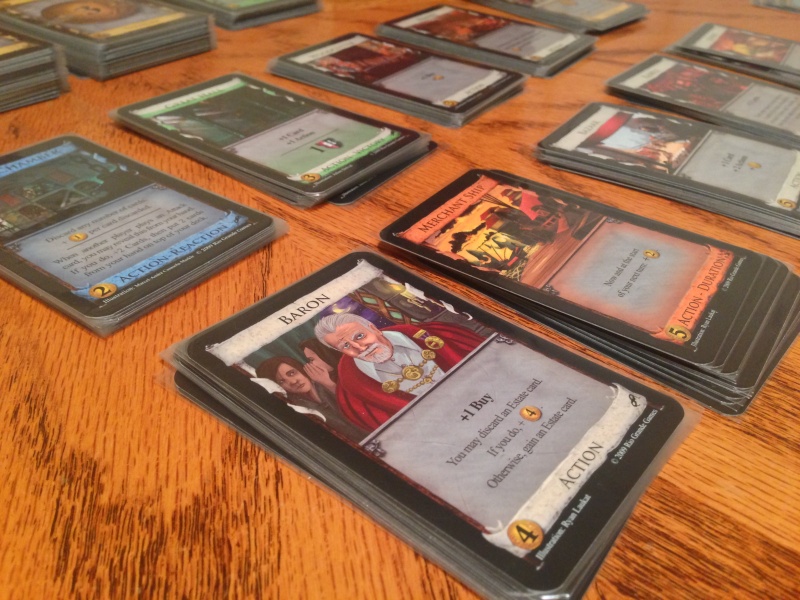 There are some games whose names are so on the mark that you know exactly what you’ll be playing just by hearing it. The Search for Planet X, for instance, lets you know there’s deduction involved. Zombicide is going to have a bunch of zombies. Twilight Struggle is also a good example, as it’s clearly based on the hit series of books and movies as sparkling vampires struggle with other vampires and, most of all, their hearts. Or something like that.
There are some games whose names are so on the mark that you know exactly what you’ll be playing just by hearing it. The Search for Planet X, for instance, lets you know there’s deduction involved. Zombicide is going to have a bunch of zombies. Twilight Struggle is also a good example, as it’s clearly based on the hit series of books and movies as sparkling vampires struggle with other vampires and, most of all, their hearts. Or something like that.
Regardless, no tabletop experience before and maybe ever again will have a name as apt as Rise, a game in which the only thing players do is rise up a series of tracks in order to rise up other tracks.
It’s designed by Remo Conzadori and Marco Pranzo for 2 to 4 players and takes about an hour to play (if everyone is moving super slowly).
Gameplay Overview:
Rise is an action selection game with limited resources and chaining player turns. The rules are actually fairly minimal. Each turn, four action cards will be displayed and players will pick which action card they want to trigger on their turn. Each card has two options—a free basic option and an upgraded option that has a cost. For the most part, all the actions correspond to a symbol that allows a player to rise up a matching track.
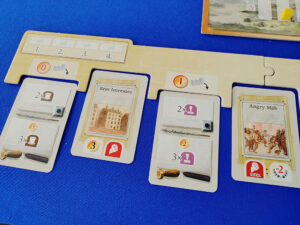
A complication to this simple act of selecting an action is that picking a card that will trigger first lets players with later actions activate a school tile They have in their possession. These school tiles—you guessed it—rise that player up a track of some kind. Also laid out in between the action cards in the row are three events which give a (usually track-related) gift to all the players who haven’t gone yet this round. So going earlier has its advantages but does limit how many beneficial free events players can ultimately take advantage of in the round.
In the interest of brevity, I will refrain from going too in depth about how each track works, but essentially each of the 10 tracks have spots that either trigger movement up a different track or carry benefits specific to that particular track. Conservation, for example, is a tug of war style track; hitting negatives here will stack penalties against a player while repeatedly hitting positives will grant points. Other tracks help players earn income and some just feature dedicated paths that offer simple actions but in an order that’s fixed and progressively improves. (Each of these 10 tracks is double sided meaning there are 1024 possible track combinations. Replay value FTW!)
Players play 12 rounds like this and then add up all their victory points (most are achieved during the game, although some tracks score points at the end.) Whoever has done the most rising is the best riser and therefore wins Rise.
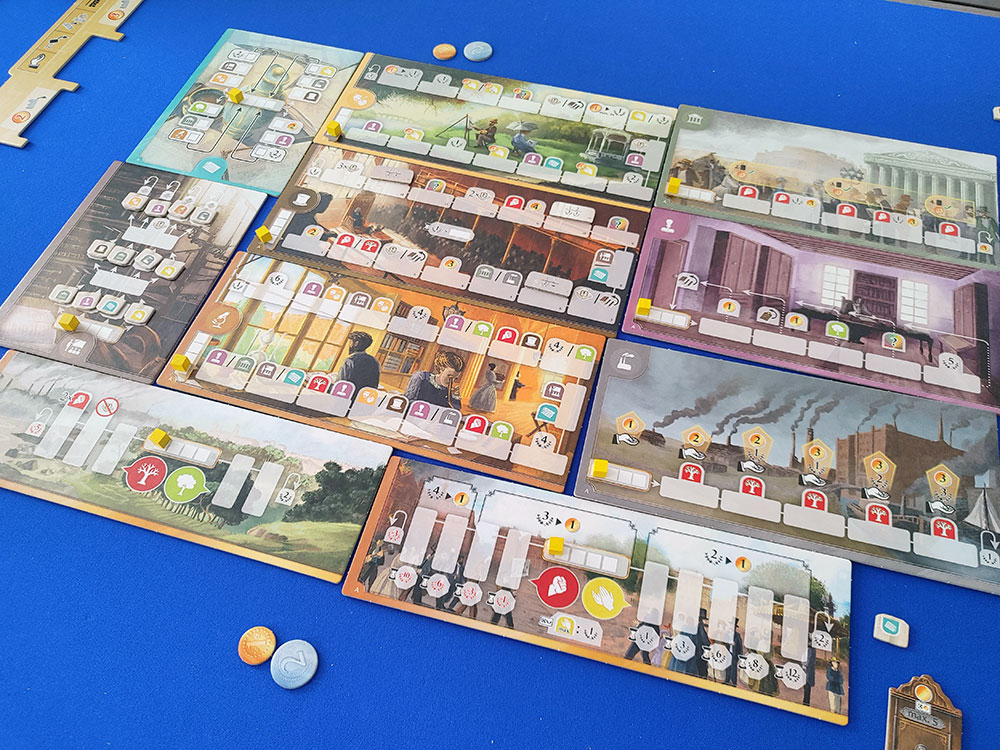
Game Experience:
The “theme” of Rise, such as it is, is apparently the development of a city. The tracks each represent an aspect of city development—banking, for instance. This notion is impossible to discern during the game unless one really puts the work in to find it. And, honestly, who has the time for that?
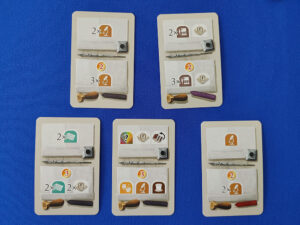
Rise is simply about picking the symbols that move you along the most beneficial track during the given turn. Some tracks offer an overall direction—the Politics track (had to look the name of it because it’s so abstracted) rewards players who advance faster and gives end-game bonuses based on progress. Other tracks like the Bureau track (sure) gives better bonuses if players are patient before triggering their benefit. Rise has repeated and near non-stop dopamine hits akin to a point-salad game and because of that, it’s incredibly fun to play.
In some ways, Rise feels like a less involved version of two recent-ish games. The easy iconography and action selection reminds me of Gutenberg, while the emphasis on all-out track advancement is somewhat like Khora: Rise of an Empire. (Hey! That one even has “rise” in its title!)
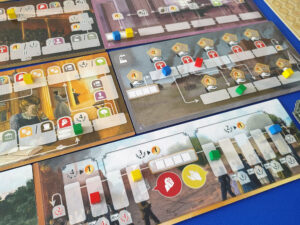
Ultimately, if you don’t like a track-based game then you likely already know how this one will make you feel. Aside from exceptional replay value, there isn’t much in this one aside from streamlined track stuff. All 12 rounds are nearly identical in terms of the decision space and the game doesn’t have a ton of momentum aside from actions getting charged up as players rise up the tracks.
With streamlined play comes the benefit of incredibly fast turns and overall playtime—my second game at two players took just 35 minutes and it’s not much longer at higher player counts after a single teach. A negative of this, however, is that the proceedings do feel a little thin at the end of the game (an issue I also noted in Gutenberg, but it’s even more pronounced here).
Final Thoughts:
The bottom line is that for a track-lover like me, Rise is an absolute blast to play. It’s remarkably fast, easy to teach, and rewarding in the way all good track games tend to be. (“Look how far I’ve gotten up all these tracks!”) It might not be as involved as some of its track-rising brethren, but it’s a welcome addition to the family and—for the foreseeable future—my gaming library.
Final score: 4 Stars. A quick, fun, and intuitive game that won’t win any awards for originality but is definitely worth a play for those looking to scratch their track-climbing itch.
 Hits:
Hits:
• Tracks!
• Easy to play
• Simple iconography
• More tracks!
• Lots of replay value
• So. Many. Tracks!
Misses:
• Entirely themeless
• Bizarre cover art (Seriously… just look at that thing. Are there ghosts in this game Smoke monsters from Lost? What exactly is going on there?)







